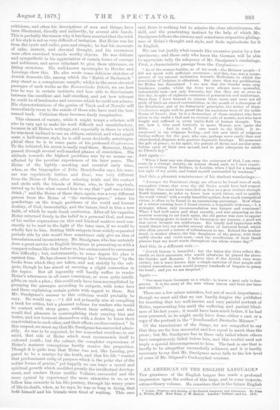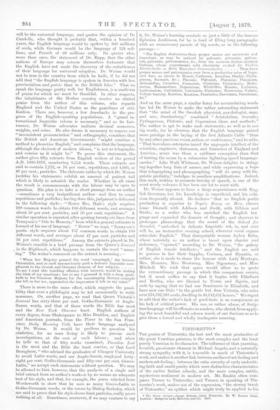AN AMERICAN ON THE ENGLISH LANGUAGE.* THE greatness of the
English tongue has made a profound impression upon the author of this large, and in some respects, extraordinary volume. He considers that in the future English
* Origin, Progress, and Dating of the Bnglish Language and Literature. By John A. Wolsee, M.D. Now York: J. W. Bouton. London: Trlinner, and Co. 1879.
will be the universal language, and quotes the opinion of De Candolle, who thought it probable that, within a hundred years, the English language would be spoken by 860 millions of souls, while German would be the language of 124 mil- lions, and French of 69 millions only. He quotes also, more than once, the statement of Dr. Rapp, that the other nations of Europe may esteem themselves fortunate that the English have not made the discovery of the suitableness of their language for universal adoption. Dr. Weisse would not be true to the country from which he hails, if he did not add that "the English language is spoken in America with less provincialism and patois than in the British Isles." That we speak the language pretty well, for Englishmen, is a modicum of praise for which we must be thankful. In other respects, the inhabitants of the Mother country receive no stinted praise from the author of this volume, who regards England and the United States as the guardians of civi- lisation. There are, however, a few drawbacks to the pro- gress of the English-speaking populations. A "grand in- ternational linguistic reform is necessary," and as its fore- runner, Dr. Weisse advocates uniform decimal measures, weights, and coins. He also deems it necessary to remove our " inconsistent pronunciation " and orthography, considers that the British and American Governments "might combine a method to phonetise English," and complains that the language, although the choicest of modern idioms, "is not as telegraphic and concise as it might be." To prove this statement, the author gives fifty extracts from English writers of the period A.D. 1600-1878, numbering 9,554 words. These extracts are said to contain 7,272, or 76 per cont., repetitions, and 4,693, or 49 per cent., particles. The elaborate tables by which Dr. Weisse justifies his statements exhibit an amount of patient toil which is likely to astonish the reader. Whether in all cases the result is commensurate with the labour may be open to question. His plan is to take a short passage from an author —sometimes a very insignificant author—and then to count repetitions and particles ; having done this, judgment is delivered in the following style :--" Hence Mrs. Halo's style requires 199 common words to obtain 100 different words, and averages about 50 per cent. particles, and 50 per cent. repetitions." A similar operation is repeated, after quoting twenty-six lines from Tennyson's " Ode to Memory," from which a general estimate is formed of his use of language. " Hence " we read, "Tennyson's poetic style requires about 157 common words to obtain 100 different words, and averages about 47 per cent. particles and 36 per cent. repetitions." Among the extracts placed iu Dr. Weisse's crucible is a brief passage from the Queen's Journal in the Highlands, which happens to contain the word " amaz- ing." The writer's comment on the extract is amusing :-
" When her Majesty penned the word 'amazingly,' she became Orientalist, and us suoh unconsciously paid a delicate linguistic com- pliment to the Jewish and Oriental element of her subjects To say I read this touching effusion with interest, would be stating the least of my emotions ; but to say I perused it with a deep grati- tude to her Gracious Majesty for the encouraging literary example she left to her sox, approaches the impression it left on my mind.
There is more to the same effect, which suggests the possi- bility that even a philologist may be led occasionally to write nonsense. On another page, we read that Queen Victoria's
Towrnal has sixty-three per cent. Gotho-Germanic or Anglo- Saxon words, and that of these words the Bible has most and the New York Observer least. English authors of every degree, from Shakespeare to Miss Braddon, and English and American journals, from the Times to the San Fran-
cisco Daily Morning Gall, have their language analysed by Dr. Weisse. It would be perilous to question his ,statistics, for no man living is likely to pursue such investigations, at the cost of such labour ; and when he tells us that of fifty works examined, Paradise Lost is the most and the Bible the least concise, or that Lord Brougham, " who advised the graduates of Glasgow University to avoid Latin words, and use Anglo-Saxon, employed forty- eight per cent. Gotho-Germanic and fifty-one per cent. Grano- Latin," we accept such statements without question. We may be allowed to hint, however, that tho analysis of a single and brief extract from an author's works is by no means an adequate test of his style, and that, for example, the poem selected from Wordsworth to show that he uses as many Grieco-Latin as Gotho-Germanic words, or the verses by Bishop Berkeley, which are said to prove that his style shows least particles, really prove nothing at all. Sometimes, moreover, if we may venture to say it, Dr. Weisse's learning reminds us just a little of the famous Ephraim Jenkinson, for lie is fond of filling long paragraphs with an unnecessary parade of big words, as in the following passage :—
" The English derivatives from proper names are numerous and important, as may be noticed by galvanic, galvanise, galvan- ism, galvanist, galvanometer, &c., from the eminent Italian scientist Galveni, 11110£10 experimonts with electricity evoked De Viribas Electricitutis in Motu Itruseillari Commentaritte Thus have proper names and patronymics over been a productive mine of lingu- istic lore, as shown in Mosaic, Cadmoan, Arcadian, Orphic, Pytha- gorean, Socratic, &c.; Platonic, Plitonist, Platonise, Platonism, Aristotelian, Caesarian, Ctosarism, Christian, Christianity, Mello- metan, Mahometism, Copernican, Wickliffite, Hussite, Lutheran, Lutheranism, Calvinistic, Calvinism, Cartesian, Newtonian, Voltaic, Voltaic battery, Kantian, Kantism, Fonrierito, Darwinian, Darwinism, &a."
And on the same page, a similar fancy for accumulating words has led Dr. Weisse to make the rather astounding statement that "the mind of the Swedish physicist, psychologist, sage, and seer, Swedenborg," combined " Aristotelian, Socratic, Pythagorean, Platonic, and Copernican ideas and methods." The author is apt to make rash statements, as well as to use big words, for he observes that the English language gained more prestige in the laying of the first Atlantic Cable " than by any other previous event, action, or contrivance," and he adds, " That herculean enterprise taxed the aggregate intellect of the scientists, engineers, statesmen, and financiers of Euglaud and America ; never was there a sublimer conception than that of taming the ocean by a submarine lightning-speed language- carrier." Like Walt Whitman, Dr. Weisse delights in string- ing together long lists of names, and while expressing a hope that telegraphing and phonographing "will do away with lin- guistic prolixity," indulges in needless amplifications. Indeed, this work, written to promote brevity of speech, is one of the most wordy volumes it has been our lot to meet with.
Dr. Weisse appears to have a large acquaintance with Eng- lish literature, but his knowledge is superficial, and his criti- cism frequently absurd. He declares "that no English poetic production is superior to Pope's Essay on Man, classes Isaac Disraeli with Addison and Swift, with Gibbon and Burke, as a writer who has enriched the English lau guage and expanded the domain of thought ; and observes in grotesque phraseology that the moral of the Scitool fur Scandal, " embodied in delicate linguistic wit, is, and ever will be, an instructive evening school, wherever vocal organs articulate English." That disreputable woman Aphra Behu, whose notoriety as an author is based upon slander and indecency, "opened," according to Dr. Weisse, "the galaxy of English female intellects ; " and the English are said to possess in her their Sappho, Corinna, and Hypatia, or rather, she is made to share the honour with Lady Montagu, Mrs. Hemans, Mrs. Browning, Miss Sigourney, and Miss Mitchell. We wish that space would allow us to quote the extraordinary passage in which this comparison occurs, but it must suffice to say that it begins with Ethelbert and Bertha, who are likened to Numa and Egeria, and ends by saying that we had our Semiramis in Elizabeth, and have now our Dido "in the gentle but firm Victoria, who rules over 234,762,593 souls, dwelling in 44,142,651 houses." We regret to add that the writer's lack of good-taste is as conspicuous as his lack of critical power. His use, or rather abuse, of Scrip- ture language will be offensive to readers, who shrink from apply- ing the most beautiful and solemn words of our Saviour so as to give them a forced and wholly inadequate meaning.



































 Previous page
Previous page